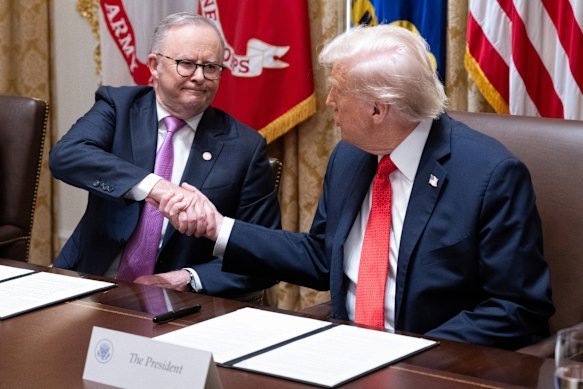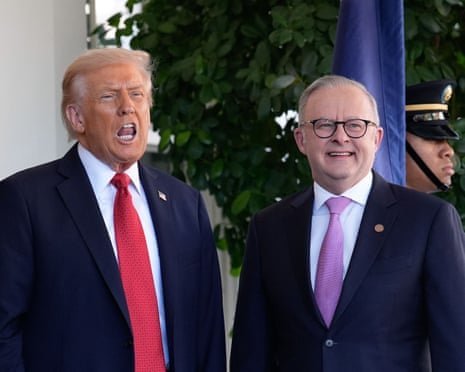Shock Revelation: Albanese’s $2.2 Trillion Superannuation Gamble with Trump Sparks Outrage
- Australia’s $4.2 trillion superannuation pool to be invested in the US, sparking claims of Albanese using Australian retirement savings as a “bargaining chip”
- The deal has raised eyebrows, with some critics arguing it’s a one-sided agreement that benefits America at the expense of Australia
- The Prime Minister’s pledge has sparked a heated debate about the government’s role in directing superannuation investments
In a stunning move, Prime Minister Anthony Albanese has vowed to increase Australia’s superannuation investment in the United States by a staggering $2.2 trillion over the next decade. The bombshell announcement, made alongside US President Donald Trump, has sent shockwaves through the nation, with many questioning the motives behind the deal.
The agreement has sparked a heated debate about the government’s role in directing superannuation investments, with some critics accusing Albanese of using Australian retirement savings as a “bargaining chip” to secure favourable trade deals with the US.
According to the deal, Australia’s superannuation funds will increase their investments in the US from $797 billion to $2.2 trillion by 2035, creating tens of thousands of new jobs for Americans. However, many have raised concerns about the potential consequences for Australian retirees, with some arguing that the government should not be dictating how superannuation savings are invested.
“This is an unprecedented investment that will create tens of thousands of new, high-paying jobs for Americans,” Trump boasted in a statement. But critics have been quick to point out that the deal appears heavily skewed in favour of the US, with some even suggesting that Albanese has been “played” by the Trump administration.

Former Liberal MP Craig Kelly was scathing in his criticism of the deal, tweeting that it was “1000 to 5” in favour of the US. “Under this deal, Australia has to invest $1000 billion in the US, and the US only invests $5 billion in Australia in return. Has there ever been a more one-sided deal?”
Shadow Treasurer Ted O’Brien also weighed in, saying that the government had no business directing superannuation investments. “It’s not a plaything of government. It is not for the government to determine how Australian savings are invested. The responsibility is for the superannuation companies themselves to maximise returns.”
Despite the backlash, industry insiders have defended the deal, citing the strength of the economic relationship between the US and Australia. “This is an updated estimate generated by industry,” a spokesman for Treasurer Jim Chalmers said. “It showcases the strength of the economic relationship between the United States and Australia.”
But as the debate rages on, one thing is clear: Albanese’s $2.2 trillion superannuation gamble has sparked a national conversation about the limits of government intervention in the economy – and the fate of Australia’s retirement savings.

